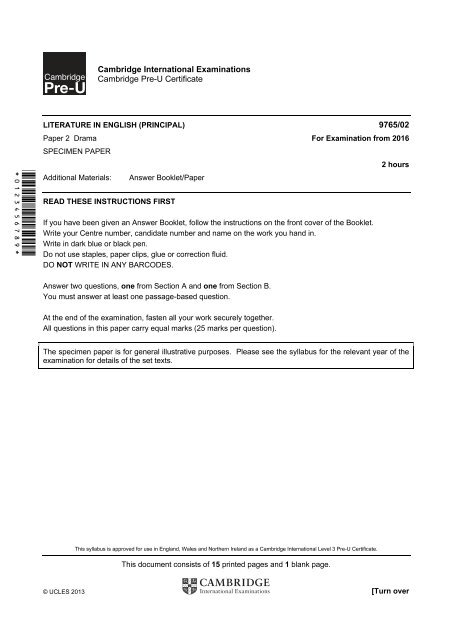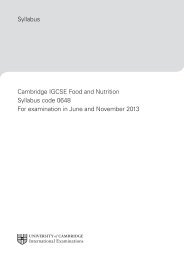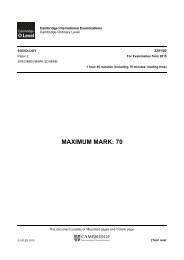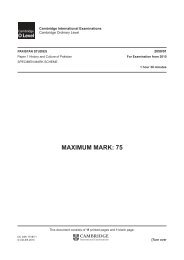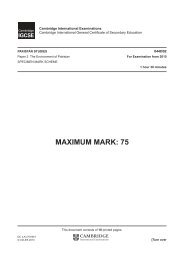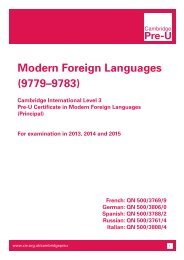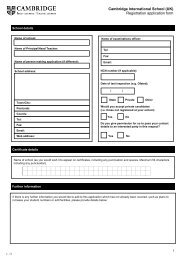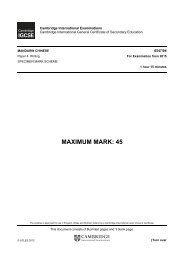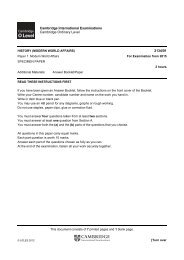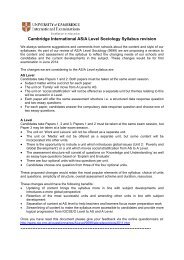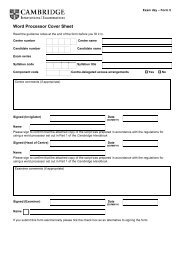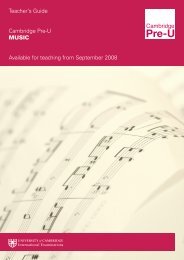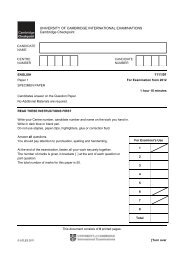Literature in English Paper 2 Drama - Cambridge International ...
Literature in English Paper 2 Drama - Cambridge International ...
Literature in English Paper 2 Drama - Cambridge International ...
You also want an ePaper? Increase the reach of your titles
YUMPU automatically turns print PDFs into web optimized ePapers that Google loves.
6WILLIAM SHAKESPEARE: K<strong>in</strong>g Lear3 Either (a) What, <strong>in</strong> your view, is the significance of the Gloucester plot to the play as a whole?Or(b) Us<strong>in</strong>g the passage below as the ma<strong>in</strong> focus of your answer, discuss the languageand dramatic action of Lear’s encounter with Kent and its significance to the play asa whole.Lear:Kent:Fool:Kent:Lear:Kent:Lear:Fool:Enter KENT (disguised.)No, I will be the pattern of all patience;I will say noth<strong>in</strong>g.Who’s there?Marry, here’s grace and a cod-piece; that’s a wise man and a fool.Alas, sir, are you here? Th<strong>in</strong>gs that love nightLove not such nights as these; the wrathful skiesGallow the very wanderers of the darkAnd make them keep their caves. S<strong>in</strong>ce I was manSuch sheets of fire, such bursts of horrid thunder,Such groans of roar<strong>in</strong>g w<strong>in</strong>d and ra<strong>in</strong>, I neverRemember to have heard. Man’s nature cannot carryTh’ affliction nor the fear.Let the great gods,That keep this dreadful pudder o’er our heads,F<strong>in</strong>d out their enemies now. Tremble, thou wretch,That hast with<strong>in</strong> thee undivulged crimesUnwhipp’d of justice. Hide thee, thou bloody hand;Thou perjur’d, and thou simular man of virtueThat art <strong>in</strong>cestuous; caitiff, to pieces shake,That under covert and convenient seem<strong>in</strong>gHast practis’d on man’s life. Close pent-up guilts,Rive your conceal<strong>in</strong>g cont<strong>in</strong>ents, and cryThese dreadful summoners grace. I am a manMore s<strong>in</strong>n’d aga<strong>in</strong>st than s<strong>in</strong>n<strong>in</strong>g.Alack, bare-headed!Gracious my lord, hard by here is a hovel;Some friendship will it lend you ’ga<strong>in</strong>st the tempest.Repose you there, while I to this hard house –More harder than the stones whereof ’tis rais’d;Which even but now, demand<strong>in</strong>g after you,Denied me to come <strong>in</strong> – return, and forceTheir scanted courtesy.My wits beg<strong>in</strong> to turn.Come on, my boy. How dost, my boy? Art cold?I am cold myself. Where is this straw, my fellow?The art of our necessities is strangeThat can make vile th<strong>in</strong>gs precious. Come, your hovel.Poor fool and knave, I have one part <strong>in</strong> my heartThat’s sorry yet for thee.[S<strong>in</strong>gs] He that has and a little t<strong>in</strong>y witWith heigh-ho, the w<strong>in</strong>d and the ra<strong>in</strong> –Must make content with his fortunes fit,Though the ra<strong>in</strong> it ra<strong>in</strong>eth every day.510152025303540© UCLES 2013 9765/02/SP/16
Lear:7True, my good boy. Come, br<strong>in</strong>g us to this hovel.[Exeunt Lear and Kent.Act 3, Scene 245© UCLES 2013 9765/02/SP/16 [Turn over
8WILLIAM SHAKESPEARE: The Tempest4 Either (a) Prospero says of Caliban that he is ‘A devil, a born devil, on whose nature/nurturecan never stick.’In what ways does the dramatic presentation of Caliban contribute to the nature/nurture debate <strong>in</strong> the play?Or(b) Us<strong>in</strong>g the passage below as your central focus, discuss the significance ofFerd<strong>in</strong>and and Miranda to the play’s action and themes.Miranda:Ferd<strong>in</strong>and:Miranda:Ferd<strong>in</strong>and:Miranda:Prospero:Miranda:Ferd<strong>in</strong>and:Miranda:Ferd<strong>in</strong>and:Enter MIRANDA; and PROSPERO at a distance, unseen.Alas, now; pray you,Work not so hard; I would the lightn<strong>in</strong>g hadBurnt up those logs that you are enjo<strong>in</strong>’d to pile.Pray, set it down and rest you; when this burns,’Twill weep for hav<strong>in</strong>g wearied you. My fatherIs hard at study; pray, now, rest yourself;He’s safe for these three hours.O most dear mistress,The sun will set before I shall dischargeWhat I must strive to do.If you’ll sit down,I’ll bear your logs the while; pray give me that;I’ll carry it to the pile.No, precious creature;I had rather crack my s<strong>in</strong>ews, break my back,Than you should such dishonour undergo,While I sit lazy by.It would become meAs well as it does you; and I should do itWith much more ease; for my good will is to it,And yours it is aga<strong>in</strong>st.[Aside] Poor worm, thou art <strong>in</strong>fected!This visitation shows it.You look wearily.No, noble mistress; ’tis fresh morn<strong>in</strong>g with meWhen you are by at night. I do beseech you,Chiefly that I might set it <strong>in</strong> my prayers,What is your name?Miranda – O my father,I have broke your hest to say so!Admir’d Miranda!Indeed the top of admiration; worthWhat’s dearest to the world! Full many a ladyI have ey’d with best regard; and many a timeTh’ harmony of their tongues hath <strong>in</strong>to bondageBrought my too diligent ear; for several virtuesHave I lik’d several women, never anyWith so full soul, but some defect <strong>in</strong> herDid quarrel with the noblest grace she ow’d,And put it to the foil; but you, O you,So perfect and so peerless, are createdOf every creature’s best!510152025303540© UCLES 2013 9765/02/SP/16
9Miranda:Ferd<strong>in</strong>and:Miranda:Ferd<strong>in</strong>and:Miranda:Prospero:I do not knowOne of my sex; no woman’s face remember,Save, from my glass, m<strong>in</strong>e own; nor have I seenMore that I may call men than you, good friend,And my dear father. How features are abroad,I am skilless of; but, by my modesty,The jewel <strong>in</strong> my dower, I would not wishAny companion <strong>in</strong> the world but you;Nor can imag<strong>in</strong>ation form a shape,Besides yourself, to like of. But I prattleSometh<strong>in</strong>g too wildly, and my father’s preceptsI there<strong>in</strong> do forget.I am, <strong>in</strong> my condition,A pr<strong>in</strong>ce, Miranda; I do th<strong>in</strong>k, a k<strong>in</strong>g –I would not so! – and would no more endureThis wooden slavery than to sufferThe flesh-fly blow my mouth. Hear my soul speak:The very <strong>in</strong>stant that I saw you, didMy heart fly to your service; there residesTo make me slave to it; and for your sakeAm I this patient log-man.Do you love me?O heaven, O earth, bear witness to this sound,And crown what I profess with k<strong>in</strong>d event,If I speak true! If hollowly, <strong>in</strong>vertWhat best is boded me to mischief! I,Beyond all limit of what else i’ th’ world,Do love, prize, honour you.I am a foolTo weep at what I am glad of.[Aside]Fair encounterOf two most rare affections! Heavens ra<strong>in</strong> graceOn that which breeds between ’em!Act 3, Scene 145505560657075© UCLES 2013 9765/02/SP/16 [Turn over
10Section BAnswer one question from this section.You must answer at least one passage-based question <strong>in</strong> the paper as a whole.JOHN WEBSTER: The White Devil5 Either (a) ‘Yes, you have ravished justice, / Forced her to do your pleasure.’ (Vittoria)Discuss Webster’s presentation of law and justice <strong>in</strong> The White Devil.Or(b) With close reference to the language and action of this passage, discuss Webster’spresentation of Flam<strong>in</strong>eo and Vittoria here and more widely <strong>in</strong> the play.Vittoria:Lodovico:Vittoria:Carlo:Zanche:Lodovico:Vittoria:Flam<strong>in</strong>eo:Vittoria:Flam<strong>in</strong>eo:Vittoria:Flam<strong>in</strong>eo:Yes I shall welcome deathAs pr<strong>in</strong>ces do some great ambassadors;I’ll meet thy weapon half way.Thou dost tremble;Meth<strong>in</strong>ks fear should dissolve thee <strong>in</strong>to air.O thou art deceived, I am too true a woman;Conceit can never kill me. I’ll tell thee what:I will not <strong>in</strong> my death shed one base tear,Or if look pale, for want of blood, not fear.Thou art my task, black Fury.I have bloodAs red as either of theirs; wilt dr<strong>in</strong>k some?’Tis good for the fall<strong>in</strong>g sickness. I am proudDeath cannot alter my complexion,For I shall ne’er look pale.Strike, strike,With a jo<strong>in</strong>t motion.[They strike.]’Twas a manly blow.The next thou giv’st, murder some suck<strong>in</strong>g <strong>in</strong>fant,And then thou wilt be famous.O, what blade is’t?A Toledo, or an <strong>English</strong> fox?I ever thought a cutler should dist<strong>in</strong>guishThe cause of my death, rather than a doctor.Search my wound deeper; tent it with the steelThat made it.O my greatest s<strong>in</strong> lay <strong>in</strong> my blood.Now my blood pays for’t.Th’art a noble sister—I love thee now; if woman do breed manShe ought to teach him manhood. Fare thee well.Know many glorious women that are famedFor mascul<strong>in</strong>e virtue have been vicious,Only a happier silence did betide them;She hath no faults, who hath the art to hide them.My soul, like to a ship <strong>in</strong> a black storm,Is driven I know not whither.Then cast anchor.Prosperity doth bewitch men seem<strong>in</strong>g clear,5101520253035© UCLES 2013 9765/02/SP/16
Vittoria:Flam<strong>in</strong>eo:11But seas do laugh, show white, when rocks are near.We cease to grieve, cease to be Fortune’s slaves,Nay, cease to die by dy<strong>in</strong>g. Art thou gone,And thou so near the bottom?—False reportWhich says that women vie with the n<strong>in</strong>e MusesFor n<strong>in</strong>e tough durable lives. I do not lookWho went before, nor who shall follow me;No, at myself I will beg<strong>in</strong> and end:While we look up to heaven we confoundKnowledge with knowledge. O, I am <strong>in</strong> a mist.O happy they that never saw the court,Nor ever knew great man but by report. VITTORIA dies.I recover like a spent taper for a flashAnd <strong>in</strong>stantly go out.Let all that belong to great men remember th’old wives’tradition, to be like the lions i’th’Tower on Candlemas day,to mourn if the sun sh<strong>in</strong>e, for fear of the pitiful rema<strong>in</strong>der ofw<strong>in</strong>ter to come.’Tis well yet there’s some goodness <strong>in</strong> my death,My life was a black charnel. I have caughtAn everlast<strong>in</strong>g cold. I have lost my voiceMost irrecoverably. Farewell, glorious villa<strong>in</strong>s;This busy trade of life appears most va<strong>in</strong>,S<strong>in</strong>ce rest breeds rest, where all seek pa<strong>in</strong> by pa<strong>in</strong>.Let no harsh flatter<strong>in</strong>g bells resound my knell,Strike thunder, and strike loud to my farewell. Dies.Act 5, Scene 6404550556065© UCLES 2013 9765/02/SP/16 [Turn over
12WILLIAM WYCHERLEY: The Country Wife6 Either (a) ‘The darker aspects of the play often disturb the surface of the comedy.’To what extent would you agree with this view?Or(b) Us<strong>in</strong>g the passage below as the ma<strong>in</strong> focus of your answer, discuss thepresentation and significance of the P<strong>in</strong>chwife marriage <strong>in</strong> the play.Mrs P<strong>in</strong>chwife:P<strong>in</strong>chwife:Mrs P<strong>in</strong>chwife:P<strong>in</strong>chwife:Mrs P<strong>in</strong>chwife:P<strong>in</strong>chwife:Mrs P<strong>in</strong>chwife:P<strong>in</strong>chwife: ‘Mrs P<strong>in</strong>chwife:P<strong>in</strong>chwife:Mrs P<strong>in</strong>chwife:P<strong>in</strong>chwife:Mrs P<strong>in</strong>chwife:P<strong>in</strong>chwife:Mrs P<strong>in</strong>chwife:P<strong>in</strong>chwife:Mrs P<strong>in</strong>chwife:P<strong>in</strong>chwife:Mrs P<strong>in</strong>chwife:I can’t abide to write such filthy words.Once more write as I’d have you, and question it not, or I willspoil thy writ<strong>in</strong>g with this. [Holds up the penknife] I will stab outthose eyes that cause my mischief.O Lord, I will!So – so – let’s see now! [Reads] ‘Though I suffered last nightyour nauseous, loathed kisses and embraces’ – go on – ‘yet Iwould not have you presume that you shall ever repeat them’– So – [She writes.]I have writ it.On then. – ‘I then concealed myself from your knowledge toavoid your <strong>in</strong>solencies’ – [She writes.]So –The same reason, now I am out of your hands’ –[She writes.]So –‘Makes me own to you my unfortunate, though <strong>in</strong>nocent, frolic,of be<strong>in</strong>g <strong>in</strong> man’s clothes’ –[She writes.]So –‘That you may for evermore cease to pursue her, who hatesand detests you’ –[She writes on.]So – h – [Sighs]What, do you sigh? – ‘detests you – as much as she loves herhusband and her honour’.I vow, husband, he’ll ne’er believe I should write such a letter.What, he’d expect a k<strong>in</strong>der from you? Come, now your nameonly.What, shan’t I say, ‘Your most faithful, humble servant tilldeath’?No, torment<strong>in</strong>g fiend! [Aside] Her style, I f<strong>in</strong>d, would be verysoft. – Come, wrap it up now, whilst I go fetch wax and acandle, and write on the backside, ‘For Mr Horner.’[Exit PINCHWIFE.]‘For Mr Horner.’ – So, I am glad he has told me his name.Dear Mr Horner! But why should I send thee such a letter thatwill vex thee and make thee angry with me? – Well, I will notsend it – Ay, but then my husband will kill me – for I seepla<strong>in</strong>ly he won’t let me love Mr Horner – but what care I for myhusband? – I won’t, so I won’t send poor Mr Horner such aletter – But then my husband – But oh – What if I writ atbottom, ‘My husband made me write it’? – Ay, but then myhusband would see’t – Can one have no shift? Ah, a Londonwoman would have had a hundred presently. Stay – what if I51015202530354045© UCLES 2013 9765/02/SP/16
13should write a letter, and wrap it up like this, and write upon’ttoo? Ay, but then my husband would see’t – I don’t know whatto do – But yet y’vads I’ll try, so I will – for I will not send thisletter to poor Mr Horner, come what will on’t.[She writes, and repeats what she hath writ.]‘Dear, sweet Mr Horner’ – so – ‘my husband would have mesend you a base, rude, unmannerly letter – but I won’t’ – so –‘and would have me forbid you lov<strong>in</strong>g me – but I won’t’ – so –‘and would have me say to you, I hate you, poor Mr Horner –but I won’t tell a lie for him’ – there – ‘for I’m sure if you and Iwere <strong>in</strong> the country at cards together’ – so – ‘I could not helptread<strong>in</strong>g on your toe under the table’ – so – ‘or rubb<strong>in</strong>g kneeswith you and star<strong>in</strong>g <strong>in</strong> your face till you saw me’ – very well –‘and then look<strong>in</strong>g down and blush<strong>in</strong>g for an hour together’ – so– ‘but I must make haste before my husband come; and nowhe has taught me to write letters, you shall have longer onesfrom me, who am,Dear, dear, poor, dear Mr Horner,Your most humble friend, and servantto command till death,Margery P<strong>in</strong>chwife.’Stay, I must give him a h<strong>in</strong>t at bottom – so – now wrap it upjust like t’other – so – now write, ‘For Mr Horner’ – But, ohnow, what shall I do with it? For here comes my husband.[Enter PINCHWIFE.]5055606570Act 4, Scene 2© UCLES 2013 9765/02/SP/16 [Turn over
14HAROLD PINTER: The Room and The Dumb Waiter7 Either (a) Discuss P<strong>in</strong>ter’s dramatic presentation of tension between characters <strong>in</strong> these plays.Or(b) Comment on the follow<strong>in</strong>g passage, pay<strong>in</strong>g close attention to ways <strong>in</strong> which P<strong>in</strong>tercreates character through language and action here and elsewhere <strong>in</strong> the plays.Scene: A room <strong>in</strong> a large house. A door down right.Content removed due to copyright restrictions.She rocks. If they ever ask you, Bert, I’m quite happy where I am.We’re quiet, we’re all right. You’re happy up here. It’s not far upeither, when you come <strong>in</strong> from outside. And we’re not bothered.And nobody bothers us.The Room© UCLES 2013 9765/02/SP/16
15BRIAN FRIEL: Danc<strong>in</strong>g at Lughnasa8 Either (a) What, <strong>in</strong> your view, do the ‘fram<strong>in</strong>g’ commentaries of the adult Michael contribute tothe concerns and dramatic action of the play?Or(b) Us<strong>in</strong>g the passage below as the ma<strong>in</strong> focus of your answer, discuss thepresentation and dramatic significance of Jack, both here and elsewhere <strong>in</strong> the play.(FATHER JACK enters. He shuffles quickly across thekitchen floor, hands beh<strong>in</strong>d his back, eyes on the ground, asContent removed due to copyright restrictions .Kate: Christ<strong>in</strong>a, Jack. Act 1© UCLES 2013 9765/02/SP/16
16BLANK PAGECopyright AcknowledgementsQuestion 7 © Harold P<strong>in</strong>ter; The Room and The Dumb Waiter; Faber & Faber Ltd; 1991.Question 8 © Brian Friel; Danc<strong>in</strong>g at Lughnasa; Faber & Faber Ltd; 1990.Permission to reproduce items where third-party owned material protected by copyright is <strong>in</strong>cluded has been sought and cleared where possible. Everyreasonable effort has been made by the publisher (UCLES) to trace copyright holders, but if any items requir<strong>in</strong>g clearance have unwitt<strong>in</strong>gly been <strong>in</strong>cluded, thepublisher will be pleased to make amends at the earliest possible opportunity.<strong>Cambridge</strong> <strong>International</strong> Exam<strong>in</strong>ations is part of the <strong>Cambridge</strong> Assessment Group. <strong>Cambridge</strong> Assessment is the brand name of University of <strong>Cambridge</strong> LocalExam<strong>in</strong>ations Syndicate (UCLES), which is itself a department of the University of <strong>Cambridge</strong>.© UCLES 2013 9765/02/SP/16


